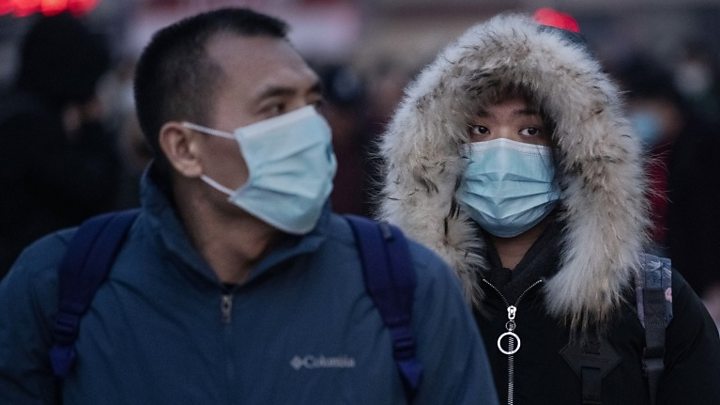
Media playback is unsupported on your device
The third person in the UK to be diagnosed with coronavirus caught it in Singapore, it is understood.
He is thought to have tested positive for the virus in Brighton before being taken to hospital in London.
New Department of Health guidance urges anyone who recently arrived in the UK from mainland China or eight other places to seek help if they are ill.
They are being advised to self-isolate if they have come back from countries including Thailand and Japan.
The countries and territories named by the DoH are:
- Thailand
- Japan
- Republic of Korea
- Taiwan
- Singapore
- Malaysia
- Hong Kong
- Macau
Anyone returning in the past 14 days from those places, or from mainland China, who has symptoms like a cough, fever, or shortness of breath should stay indoors and call the NHS 111 service.
The DoH said they should do so "even if symptoms are mild", adding: "These countries have been identified because of the volume of air travel from affected areas, understanding of other travel routes and number of reported cases. This list will be kept under review."
The third UK patient is understood to be a middle-aged man who was isolated at home, tested positive and was taken to St Thomas's Hospital in central London, where he is being treated at a specialist infectious diseases unit. It had previously been reported he was at Guy's Hospital in the city.
The NHS was "well prepared" to manage cases, said Prof Chris Whitty, England's chief medical officer. He added: "We are now working quickly to identify any contacts the patient has had."
There have been 28,265 cases worldwide.
Of these, 565 people have died but only two of the deaths have been outside mainland China - one in Hong Kong and one in the Philippines.
Meanwhile, the Chinese ambassador to the UK warned against "panic" and "over-reaction" in response to the virus.
Two other patients - both Chinese nationals - are still being treated at the Royal Victoria Infirmary infectious diseases centre in Newcastle.
The patients - a university of York student and one of their relatives - tested positive for the virus after falling ill at a hotel in York.
The University of Sussex, which has a campus on the outskirts of Brighton, said in a statement the new case was not a student or member of staff from the university.
This is not a surprise, not a reason to panic and not a reason to press the alarm bell.
For as long as the epidemic rages in China, there is a risk of people travelling to other countries, including the UK, before they become sick.
But there are crucial differences between the UK and China.
First is the scale of the problem. The UK has three confirmed cases, China has 28,000.
This case in the UK is an event that was planned for - the patient is already being isolated and anybody who came into close contact is being traced.
It is also notable this patient caught the infection abroad, it is not due to the York patients spreading the virus.
China, however, is still playing catch-up and fighting to get on top of the outbreak.
The big question is not whether the UK can handle these three cases, it's whether China can contain the outbreak.
Earlier, the Chinese ambassador to the UK, Liu Xiaoming, called on the UK government to support China in its handling of the outbreak and said Chinese measures to control the spread of the virus had been effective.
China is introducing more restrictive measures. In some areas group dining is banned, there are limits on how often people can go outside, and lifts have been turned off in some buildings.
It comes as the Chinese doctor who tried to issue the first warnings about the outbreak has died of the infection, according to Chinese media.
Nearly 100 Britons have been flown out of Wuhan, the city at the centre of the outbreak, on flights arranged by the UK government.
All are now in quarantine at Arrowe Park Hospital in Wirral for 14 days - the incubation period of the virus - to ensure they are not carrying the infection.
The UK government is chartering a final flight to bring British nationals back from Wuhan, which is due to leave on Sunday.
The Foreign Office has also advised Britons in other parts of China to leave the country if they can to minimise the risk of exposure to the virus, which has now spread to more than two dozen nations.
The World Health Organization said the world was still "shadow boxing" with the new virus because many things about it remain unknown, including its precise origin, transmissibility and its severity.
The WHO had declared the outbreak to be a global health emergency last week but said it did not yet constitute a "pandemic".
The coronavirus causes severe acute respiratory infection and symptoms usually start with a fever, followed by a dry cough. Most people infected are likely to fully recover - just as they would from a flu.
What questions do you have about the Coronavirus?
In some cases your question will be published, displaying your name, age and location as you provide it, unless you state otherwise. Your contact details will never be published. Please ensure you have read our terms & conditions and privacy policy.
Use this form to ask your question:
If you are reading this page and can't see the form you will need to visit the mobile version of the BBC website to submit your question or send them via email to YourQuestions@bbc.co.uk. Please include your name, age and location with any question you send in.
https://news.google.com/__i/rss/rd/articles/CBMiJGh0dHBzOi8vd3d3LmJiYy5jb20vbmV3cy91ay01MTM5ODAzOdIBKGh0dHBzOi8vd3d3LmJiYy5jb20vbmV3cy9hbXAvdWstNTEzOTgwMzk?oc=5
2020-02-06 19:28:48Z
52780593796749
Tidak ada komentar:
Posting Komentar